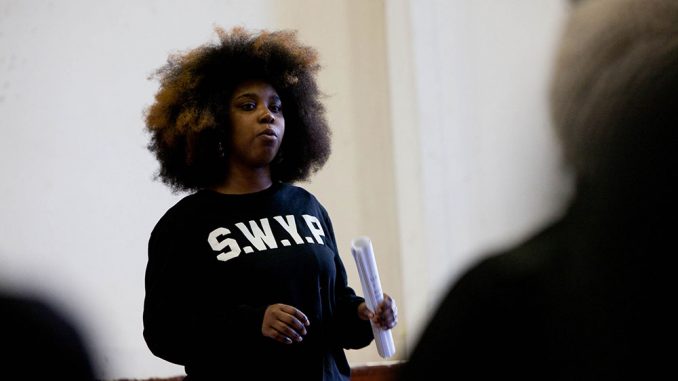
The coalition of students and community members who have rallied around the dismissal of African American studies professor Anthony Monteiro agreed in a meeting last week to continue and intensify public protests in an effort to force the Temple administration to agree to a set of demands.
Justice for Dr. Anthony Monteiro members’ central demands include the reinstatement of Monteiro to a full-tenured position within the African American studies department and the firing of College of Liberal Arts dean Teresa Soufas, who approved the nonrenewal of Monteiro’s annual contract in January.
Several other student groups have rallied around Monteiro, including People Using Real Power and the Temple Democratic Socialists.
In a roughly two-hour meeting held at the Church of the Advocate on 18th and Diamond streets on March 18, members of Justice for Dr. Anthony Monteiro discussed developing their list of demands and holding staged protests to pressure the university to comply.
In addition to Monteiro’s reinstatement and Soufas’ firing, the group is also calling for the university to develop community relations and build centers to celebrate black history. The discussion also turned to whether the group should further its demands to include the firing of current AAS department chair Molefi Asante, who less than a year ago was at the center of demonstrations to have him appointed to the position.
In a statement released Monday, Temple said it welcomes freedom of speech, but did not respond directly to the students’ demands.
“Temple University leaders welcome the opportunity for dialogue, and we are grateful to the community members and students who have taken the time in recent weeks to share their concerns with the president, the Board of Trustees and cabinet-level university officials about Dr. Monteiro and other subjects,” the statement said.
Monteiro and his supporters claim that Soufas’ decision not to renew his contract is the result of Monteiro’s vocal opposition to Soufas’ handling of the vacancy of the AAS chairmanship after former department chairman Nathaniel Norment’s retirement in the Spring 2012.
In the Spring 2013, members of the department and community activists held a series of public demonstrations calling for Asante, who led the department from 1984 to 1997, to be reappointed after Soufas chose Jayne Drake, a white woman, to lead the department on an interim basis.
Monteiro was an outspoken proponent of Asante, but now his supporters say the chairman betrayed his former ally to curry favor with the dean, whose relationship with the department was soured by allegations of racism during the protests in the Spring 2013.
“I think it is a betrayal to the African-American community, the African-American students, and the African-American faculty and the African-American studies program,” Anthony Pressley, a junior AAS major said. Pressley said he thinks his beliefs are not widely shared among his peers, saying “they are disillusioned with the conflicting words coming out.”
Monteiro said it was not his position the Asante be fired.
Asante did not respond to a request for comment.
Monteiro has also said he was removed without cause from overseeing a graduate dissertation committee in Fall 2013.
In 2004, the Graduate Board approved criteria for chairing dissertation committtes that limited such roles to tenure and tenure-track faculty. Non-tenure track faculty with a terminal degree may direct masters theses and serve on, but not direct dissertation committees.
Members of the group discussed acts of civil disobedience which ranged from a class walkout and rally at the Bell Tower to holding sit-downs to block off Broad Street and Cecil B. Moore Avenue.
However, there was dissent among group members as to the necessity of such action, when some members said that attempts to block traffic would disrupt members of the community whom they are trying to show support.
Paul-Winston Cange, a junior political science major with a minor in AAS who is an organizer for Justice for Dr. Anthony Monteiro, spoke at the meeting, calling for “no tuition without representation.”
“I was just saying that to draw debate around the idea of representation,” Cange said afterward, adding that no plans of action had been decided upon.
One popular idea was holding demonstrations during Experience Temple Days in April when prospective students visit Main Campus.
Ultimately, the meeting ended after two hours with no formal vote being held on how to amend the list of demands or what actions should be taken and when. The group did agree to add an agitation committee on top of the already formed Academic Demand Committee and Community Demand Committee. The group planned to hold another meeting this week to plan out further action.
Monteiro was not in attendance at the Church of the Advocate meeting; however the week prior he met with supporters to discuss their demands in person with Senior Vice President for Government, Community and Public Affairs Ken Lawrence.
Monteiro, who was not tenured or tenure-track, has taught at the university for 10 years as a full-time associate professor. Monteiro said he left a previous tenured position at the University of the Sciences to work for a tenured position under Norment.
Senior Vice Provost for Faculty Affairs Diane Maleson said tenured positions cannot be promised to new faculty members.
There were no protests or demonstrations held at the most recent Experience Temple Day, held on Sunday.
John Moritz can be reached at john.moritz@temple.edu or on Twitter @JCMoritzTU.


Be the first to comment